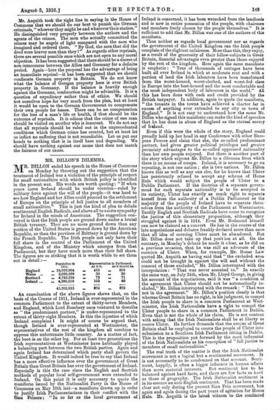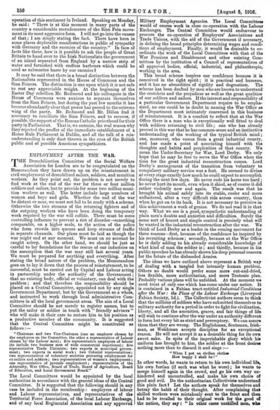MR. DILLON'S DILEMMA.
MR. DILLON ended his speech in the House of Commons on Monday by throwing out the suggestion that the treatment of Ireland was a violation of the principle of respect for small nationalities with which British policy is identified in the present war. His words are worth quoting : " If when peace came Ireland should be under coercion—ruled by military force against the will of the people—it was hard to see how England and her Allies could proceed to the settlement of Europe on the principle of full justice to all members of small nationalities." This is just the kind of plea to delude sentimental English Radicals, and above all to excite sympathy for Ireland in the minds of Americans. The suggestion con- veyed is that the Irish people are ground down under a brutal British tyranny. They are no more ground down than any portion of the United States is ground down by the American Republic, or than the province of Brittany is ground down by the French Republic. The Irish people not only have their full share in the control of the Parliament of the United Kingdom, and of the Ministry which emerges from that Parliament, but they have much more than their full share. The figures are so striking that it is worth while to set them
Population In 1911.
Representation in Parliament.
As it is. As it should be.
zgland 34,039,904 .„ 465 503 Wales — 2,030,588
30 30 Sootland 4,743,224
72 71 Ireland .. 4,390,219
103 66
45.203,935 — 670 — 670
An examination of the above figures shows that, on the basis of the Census of 1911, Ireland is over-represented in the common Parliament to the extent of thirty-seven Members, and England, which Lord Rosebery once ventured to describe as " the predominant partner," is under-represented to the extent of thirty-eight Members. Is this the injustice of which Ireland complains 9 It might of course be argued that, though Ireland is over-represented at Westminster, the representatives of the rest of the kingdom all combine to oppress this unfortunate little country. As a matter of fact, the boot is on the other leg. For at least two generations the Irish representatives at Westminster have habitually played a balancing part between the two British parties. Again and again Ireland has determined which party shall govern the United Kingdom. It would indeed be true to say that Ireland has a more effective influence over the government of Great Britain than Great Britain has over the government of Ireland. Especially is this the case since the English and Scottish methods of popular local self-government were extended to Ireland. On this point it is only necessary to quote the manifesto issued by the Nationalist Party in the House of Commons on May 10th last—a manifesto drawn up in order to justify Irish Parliamentarians in their conflict with the Sinn Femers ; " In so far as the local government of out in detail :— Ireland is concerned, it has been wrenched from the landlords and is now in entire possession of the people, with chairmen and members freely chosen by the people themselves." It in sufficient to add that Mr. Dillon was one of the authors of this manifesto.
Thus neither as regards local government nor as regards the government of the United Kingdom can the Irish people complain of the slightest unfairness. More than this, they enjoy, as a result of the generosity of their fellow-subjects in Great Britain, financial advantages even greater than those enjoyed by the rest of the kingdom. Here again the same manifesto is emphatic : " Tens of thousands of cottages have been built all over Ireland in which at moderate rent and with a portion of land the Irish labourers have been transformed from the worst-housed, worst-clothed, and worst-fed class in Europe into the best-housed and the most comfortable and the most independent body of labourers in the world." All this has been done with cash and credit provided by the British taxpayer. In addition, again to quote the manifesto, " the tenants in the towns have achieved a charter far in excess of anything ever extended to any city or town of England." It is not easy to understand how the same Mr. Dillon who signed this manifesto can make the kind of speeches that he has done in abuse of England as the eternal enemy of Ireland.
Even if this were the whole of the story, England could proudly hold up her head in any Conference with other Euro- pean Powers and claim that she, the so-called predominant partner, had given greater political privileges and greater pecuniary advantages to the so-called oppressed nationality than her own people enjoyed. But there is another part of the story which exposes Mr. Dillon to a dilemma from which there is no means of escape. Ireland, it is necessary to go on repeating, is not one nation ; she is two nations. Mr. Dillon knows this as well as any one else, for he knows that Ulster has persistently refused to accept any scheme of Home Rule which would subject the people of Ulster to a Dublin Parliament. If the doctrine of a separate govern- ment for each separate nationality is to be accepted in its entirety, Ulster has exactly as much right to separate herself from the authority of a Dublin Parliament as the majority of the people of Ireland have to separate them- selves from the authority of the Parliament at Westminster. Tardily English and Scottish Radicals have come to recognize the justice of this elementary proposition, although they struggled against it in 1914. Even Mr. Redmond himself can now be claimed as a convert He has in the course of the late negotiations and debates frankly declared more than once that all idea of coercing Ulster must be abandoned. But Mr. Dillon does not take up that posit ion at all. On the contrary, in Monday's debate he made it clear, as he did on a previous occasion, that he was still an advocate of the coercion of Ulster. When, for example, Mr. Boner Law quoted Mr. Asquith as having said that " the excluded area could not be brought in against the will and without the consent of those excluded," Mr. Dillon interrupted with the interpolation : " That was never assented to." In exactly the same way, on July 24th, when Mr. Lloyd George, in giving his account of the negotiations, said it was " a condition of the agreement that Ulster should not be automatically in- cluded," Mr. Dillon interrupted with the remark : " That was not in the agreement." Mr. Dillon's position clearly is that whereas Great Britain has no right, in his judgment, to compel the Irish people to share in a common Parliament at West- minster, the Irish Nationalists have a right to compel the Ulster people to share in a common Parliament in Dublin. Even that is not the whole of his claim. He is not content with asking that the Irish Nationalists shall be at liberty to coerce Ulster. He further demands that the armies of Great Britain shall be employed to coerce the people of Ulster into submission to a Southern Irish Parliament sitting in Dublin. This is the proposition put forward by the most influential of the Irish Nationalists as his conception of " full justice to members of small nationalities."
The real truth of the matter is that the Irish Nationalist movement is not a logical but a sentimental movement. It is not necessarily to be condemned on that iaccount. Senti- ment, happily, is often a bigger influence in human affairs than mere material interests. But sentiment has to be balanced against hard facts, and there are few facts so hard as those of geography. The Irish Nationalist sentiment is in its essence an anti-English sentiment. That has been made clear not only during the present Sinn Fein movement, but again and again during the past years of agitation for Home Rule. Mr. Asquith is the latest witness to the continued operation of this sentiment in Ireland. Speaking on Monday, he said : " There is at this moment in many parts of the country a considerable recrudescence of the Sum Fein move- ment in its most aggressive form. I will not go into the causes of that ; I am simply stating the fact. There have been in some places deplorable manifestations in public of sympathy with Germany and the enemies of the country." In face of facts like these, how is it possible to ask the people of Great Britain to hand over to the Irish Nationalists the government of an island separated from England by a narrow strip of water and furnished with endless harbours which could be used as submarine bases by our enemies I It may be said that there is a broad distinction between the Nationalists represented in the House of Commons and the Sinn Feiners. The distinction is one upon which it is not safe to rest any appreciable weight. At the beginning of the Easter Day rebellion Mr. Redmond and his colleagues in the House of Commons were anxious to separate themselves from the Sinn Feiners, but during the past few months it has become abundantly clear that power has passed to the extreme wing of the party. Mr. Redmond and Mr. Dillon find it necessary to conciliate the Sinn Feiners, and to recover, if possible, the support of the Roman Catholic priesthood for their party in Parliament. That is, we surmise, the real reason why they rejected the proffer of the immediate establishment of a Home Rule Parliament in Dublin, and all the talk of a mis- understanding is only dust thrown in the eyes of the British public and of possible American sympathizers.































 Previous page
Previous page